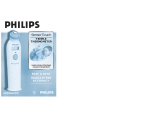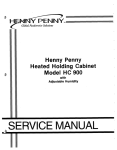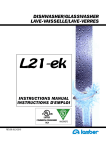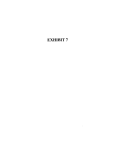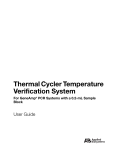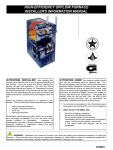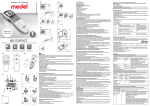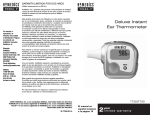Download Graco 1750365 User's Manual
Transcript
Ear Thermometer OWNER'S MANUAL KEEP INSTRUCTIONS FOR FUTURE REFERENCE. 1 ©2008 Graco PD104815A 9/08 Failure to follow these warnings and the assembly instructions could result in serious injury or death. • This product not to be used as a toy. • WARNING: This product is not a toy. • DO NOT immerse any part of the Ear Thermomete, in water. Clean only with a dry cloth. • DO NOT place unit near water and moisture. Do not use the Ear Thermometer outdoors. Do not use the Ear Thermometer near possible wet areas, such as a bathtub, shower, wash basin, sink, laundry tub, swimming pool, wet basement, etc. • Keep Ear Thermometer away from heat sources, such as fireplaces, radiators, stoves, and TVs or other appliances. Heat can damage the case or electrical parts. 2 • DO NOT use the Ear Thermometer Unit if: • The unit has been exposed to liquids. • Unit has been dropped or is damaged. • DO NOT OPEN THE EAR THERMOMETER. No user-serviceable parts inside. Risk of electrical shock, fire or death. • Do not drop the instrument! Protect it from severe impact and shock. 3 FOR SAFE BATTERY USE: Keep the batteries out of children’s reach. Any battery may leak battery acid if mixed with a different battery type, if inserted incorrectly (put in backwards) or if all batteries are not replaced or recharged at the same time. Do not mix old and new batteries. Do not mix alkaline, standard (carbon-zinc) or rechargeable (nickel-cadmium) batteries. Any battery may leak battery acid or explode if disposed of in fire or an attempt is made to charge a battery not intended to be recharged. Never recharge a cell of one type in a recharger made for a cell of another type. 4 Discard leaky batteries immediately. Leaky batteries can cause skin burns or other personal injury. When discarding batteries, be sure to dispose of them in the proper manner, according to your state and local regulations. Remove batteries before storing product for a prolong period of time. Batteries left in the unit may leak and cause damage. Recommended type batteries— disposables, size 3-volt CR 2032 Lithium battery. NEVER mix battery types. Change batteries when product ceases to operate satisfactorily. Always remove batteries if the product is not going to be used for a month or more. Batteries left in the unit may leak and cause damage. Recommended type batteriesdisposables, size 3-volt CR 2032 Lithium battery. NEVER mix battery types. Change batteries when product ceases to operate satisfactorily. 5 WARNING Modifications not authorized by the manufacturer may void users authority to operate this device. NOTE: This equipment has been tested and found to comply with the limits for a Class B digital device, pursuant to Part 15 of the FCC Rules. These limits are designed to provide reasonable protection against harmful interference in a residential installation. This equipment generates, uses and can radiate radio frequency energy and, if not installed and used in accordance with the instructions, may cause harmful interference to radio communications. However, there is no guarantee that interference will not occur in a particular installation. If this equipment does cause harmful interference to radio or television reception, which can be determined by turning the equipment off and on, the user is encouraged to try to correct the interference by one or more of the following measures: • Reorient or relocate the receiving antenna. 6 • Increase the separation between the equipment and receiver. • Connect the equipment into an outlet on a circuit different from that to which the receiver is connected. • Consult the dealer or an experienced radio/ TV technician for help. This device complies with part 15 of the FCC Rules. Operation is subject to the following two conditions: (1) This device may not cause harmful interference, and (2) This device must accept any interference received, including interference that may cause undesired operation. 7 Overview Probe Power & scan button Memory button LCD display Battery cover Bag Accessories (On certain models) Storage case 8 Symbol Key Degrees of temperature Temperature is being scanned Smiling face indicating temperature lower than 100.4°F (38°C) Frowning face indicating temperature of 100.4°F (38°C) or higher Fahrenheit Celsius Low battery warning Replace battery Memory symbol Temperature is below 93.2°F (34°C) Temperature is above 109.4°F (43°C) Ambient temperature is outside thermometer’s range 60.8°-104°F (16°-40°C) 9 Battery Installation NOTE: The word “Lo” by itself does not mean that the battery is low and needs to be charged. It means that the temperature being measured is out of the thermometer’s range (see Fig. 8). Replace the battery when the low battery symbol appears (see Fig. 1). If only the symbol appears, you may still use the thermometer but you will need to replace the battery soon. If the symbol appears with the word “Lo” (see Fig. 2), you must replace the battery to use the thermometer. Figure 1 Figure 2 1. Slide the battery compartment lid off. 2. Carefully push back on the battery release using a non-metal tool. Battery will pop up (see Fig. 4). Figure 3 3. Remove old battery from compartment and discard immediately. 4. Insert one 3-volt CR 2032 lithium battery with the positive side (+) facing up. 5. Replace the battery compartment lid by sliding it forward. 10 Figure 4 Instructions for use Please do not use this ear thermometer when the ear canal is wet. 1. Press and release the Power/ Scan button. The system will start it’s self-testing cycle (see Fig. 5). Figure 5 2. Once the self-testing is completed (approximately 1 second), the thermometer will beep and the display will Figure 6 show the last temperature recorded. This indicates the thermometer is ready to take a temperature (see Fig. 6). 3. Press the Power/Scan button again. The symbol will appear beneath the last Figure 7 reading (see Fig. 7). The word “Lo” may also appear indicating the temperature is lower than 93.2°F (34°C) (see Fig. 8). NOTE: The word “Lo” Figure 8 by itself does not mean that the battery is low and needs to be charged unless the low battery icon appears with it (see Fig. 2). It means that the temperature being measured is out of the thermometer’s Figure 9 range. 4. Insert the probe into the ear canal. The probe must be inserted well into the ear to allow the probe tip to continuously scan the ear canal. This will ensure an accurate temperature measurement (see. Fig. 9). 11 5. After one second you will hear a beep indicating the reading is complete. Remove the thermometer from the ear to get the temperature reading. 6. A smiling face will appear indicating a temperature reading lower than 100.4°F (38°C). A frowning face accompanied by one long and two short beeps will indicate a temperature of 100.4°F (38°C) or higher (see Figs. 10 & 11). 7. You do not need to manually shut off the thermometer. It will automatically shut off after one minute of non-use. 8. To change the reading from Celsius to Fahrenheit, press the Power/Scan button without releasing it, then press the blue M button on the underside of the thermometer. First release the M button and then the Power/Scan button. 9. The Ear Thermometer stores and recalls the last 10 temperature readings. To recall the prior readings simply press the blue M button on the underside of the thermometer. The memory symbol, the number of the reading, and the temperature reading will appear on the display (see Fig. 12). 12 Figure 10 Figure 11 10. If you want to immediately take another reading, please wait at least 10 seconds. 11. The temperature may vary between both ears so try to take it from the same ear each time. 12. The thermometer has a temperature range of 93.2°-109.4°F (34°-43°C). If the temperature being measured is below the range, the word “Lo” will appear. The word “Hi” will appear when the temperature measured is above 109.4°F (43°C) (see Figs. 13 &14) 13. If the ambient temperature is outside the thermometer’s range (60.8°-104°F/16°40°C), the word “Err” will appear (see Fig. 15). Figure 12 Figure 13 Figure 14 Figure 15 13 Care and maintanance 1.The ear thermometer is a delicate electronic device. Although the probe can be cleaned with isopropyl alcohol, the body of the thermometer should never be submerged in water or any other liquid. 2.Clean the probe with a cotton swab moistened with isopropyl alcohol after every measurement and before each use. Clean the body of the thermometer with a soft dry cloth. Never use an abrasive. 3.Avoid touching the probe with your fingers. 4.Do not expose the thermometer to direct sunlight. 5.Keep out of the reach of children when not in use. The optimal storage temperature range is 4°-122°F (-20°-50°C). 6.Use the ear thermometer to take temperature from the ear canal only. Do not use it to take rectal, oral, or underarm temperatures. 7.Do not disassemble the thermometer. 8.Only use a 3-volt CR-2032 lithium battery. 14 Troubleshooting 1. Consistent low temperature readings. a.The probe is not positioned properly in the ear canal. The tip of the probe must be snug and fully seated against the opening of the ear canal. Failure to properly position the probe may lead to a low temperature reading. b.The probe lens is dirty. Clean the lens with a soft cloth moistened with water or isopropyl alcohol. 2.The word “Lo” or “Hi” appears. Temperature is out of the range of thermometer. a.The probe is not positioned properly in the ear canal. The tip of the probe must be snug and fully seated against the opening of the ear canal. Please properly position the ear thermometer in the ear canal and then repeat the measurement. 3.Thermometer will not take a reading. a.Check to see if the low battery icon appears with the word “Lo”. If it does, the battery needs to be replaced. See Battery Installation section of the manual. b.Check to see if the low battery icon appears by itself. If it does, the battery may need to be replaced. See the Battery Installation section of the manual. 15 Applied standards and approvals This product conforms to the provisions of the EC directive MDD(93/42/EEC). The following standards apply to design and/or manufacturing of the products: • ASTM E1965-98: Standard Specification for infrared thermometers for intermittent determination of patient temperature. • IEC/EN980:1997: Graphical symbol for use in the labeling of medical devices. • IEC/EN60601-1: Medical electrical equipment – Part 1: General requirement for safety. • IEC/EN60601-1-2: Medical electrical equipment – Part 2: Collateral standard: Electromagnetic compatibility – Requirements and tests. • ISO 14971 Risk Management 16 Notes 17 Notes 18 Notes 19 Replacement Parts Warranty Information (USA) To purchase parts or accessories or for warranty information in the United States, please contact us at the following: www.elfe.net ou 1-800-667-8184 Montreal (514-344-3533) Fax: 514-344-9296 Product Registration (USA) To register your Graco product from within the U.S.A. visit us online at www.gracobaby.com/productregistration. We currently do not accept product registrations from those living outside the United States of America. 20 Thermomètre auriculaire MANUEL D'UTILISATEUR GARDEZ CES INSTRUCTIONS POUR USAGE FUTUR. 1 ©2008 Graco PD104815A 9/08 Ne pas se conformer à toutes les mises en garde et directives de montage peut causer des blessures graves ou même la mort. • Ce produit ne doit pas servir de jouet. • MISE EN GARDE : Ce produit n’est pas un jouet. • N’IMMERGER AUCUNE partie du thermomètre auriculaire (thermomètre auriculaire) dans l’eau. Nettoyer uniquement avec un chiffon sec. • NE PAS exposer l’appareil à l’eau ou à l’humidité. Ne pas utiliser le thermomètre auriculaire à l’extérieur. Ne pas utiliser le thermomètre auriculaire à proximité d’endroits qui peuvent être mouillés, comme une baignoire, une douche, une cuvette, un évier, un bac à lessive, une piscine, un sous-sol humide, etc. • Tenir le thermomètre auriculaire éloigné des sources de chaleur, comme les foyers, les radiateurs, les cuisinières, les téléviseurs et autres appareils ménagers. La chaleur peut endommager le boîtier ou les composants électriques. 2 • NE PAS utiliser le thermomètre auriculaire si : • L’appareil a été exposé à des liquides. • L’appareil a été échappé ou est endommagé. • NE PAS OUVRIR LE THERMOMÈTRE AURICULAIRE. Ne renferme aucune pièce que l’utilisateur peut réparer lui-même. Danger d’électrocution, d’incendie ou de décès. • Ne pas échapper cet instrument! Protéger contre tout impact ou choc grave. 3 UTILISATION SÉCURITAIRE DES PILES : Conserver les piles hors de la portée des enfants. Toutes les piles peuvent produire des fuites d’acide si on mélange différents types de piles, si on les insère incorrectement (à l’envers) ou si les piles ne sont pas toutes remplacées ou rechargées en même temps. Ne pas utiliser ensemble des piles neuves et usagées. Ne pas mélanger des piles alcalines et régulières (carbone-zinc) ou rechargeables (nickel-cadmium). Toutes les piles peuvent produire des fuites d’acide ou exploser si on les jette au feu ou si on tente de recharger une pile non rechargeable. Ne jamais recharger de piles d’un type dans un chargeur conçu pour un autre type. 4 Jeter immédiatement toute pile qui fuit. Les piles qui fuient peuvent causer des brûlures cutanées et d’autres blessures. Les piles doivent être mises aux rebuts selon la méthode approuvée, dans le respect des lois et règlements provinciaux ou locaux. Retirer les piles avant de remiser ce produit pour une période prolongée. Les piles laissées dans l’appareil peuvent fuir et causer des dommages. Type de piles recommandées : au lithium jetables, format 3 volts, CR 2032. NE JAMAIS utiliser ensemble des piles de types différents. Remplacer les piles lorsque l’appareil ne fonctionne plus de manière satisfaisante. Toujours retirer les piles si ce produit ne doit pas être utilisé pendant un mois ou plus. Les piles laissées dans l’appareil peuvent fuir et causer des dommages. Type de piles recommandées : au lithium jetables, format 3 volts, CR 2032. NE JAMAIS utiliser ensemble des piles de types différents. Remplacer les piles lorsque l’appareil ne fonctionne plus de manière satisfaisante. 5 MISE EN GARDE Toute modification non autorisée par le fabricant peut annuler le droit de l’utilisateur à faire fonctionner cet appareil. REMARQUE: Cet appareil a été testé et prouvé conforme aux normes d’un appareil numérique de catégorie B, conformément au chapitre 15 du règlement de la CFC. Ces limites sont conçues afin de fournir une protection raisonnable contre les interférences nuisibles dans une installation résidentielle. Cet appareil produit, utilise et émet de l’énergie des fréquences radio. S’il n’est pas installé et utilisé conformément à ces consignes, il peut occasionner des interférences nuisibles aux communications radio. Cependant, il n’y a aucune garantie qu’il ne se produira pas d’interférences dans une installation en particulier. Si cet appareil cause des interférences qui nuisent à la réception d’un appareil de radio ou de télévision, ce qu’on peut vérifier en allumant et éteignant l’appareil, l’utilisateur est invité à tenter de remédier à la situation par l’une ou 6 plusieurs des mesures suivantes : • Réorienter ou déplacer l’antenne réceptrice. • Augmenter la distance entre l’appareil et le récepteur. • Brancher l’appareil dans un circuit différent de celui du récepteur. • Consulter le détaillant ou un technicien en radio/télévision expérimenté. Cet appareil est conforme au chapitre 15 du règlement de la CFC. Son fonctionnement est assujetti aux deux conditions suivantes : (1) Cet appareil ne risque pas de causer des interférences nuisibles. (2) Cet appareil doit accepter toutes les interférences reçues, incluant les interférences qui peuvent causer un fonctionnement inadéquat. 7 Aperçu Sonde Bouton d'alimentation et de balayage Bouton mémoire Dispositif d’affichage ACL Couvercle du compartiment à piles Sac Accessoires (sur certains modèles) Boîtier de rangement 8 Légende Degrés de température La température est en cours de lecture Le visage souriant indique que la température est inférieure à 38 °C (100,4 °F) Le visage mécontent indique que la température est égale ou supérieure à 38 °C (100,4 °F)< Fahrenheit Celsius Avertissement en cas de piles faibles Remplacer les piles. Symbole de mémoire La température est inférieure à 34 °C (93,2 °F). La température est supérieure à 43 °C (109,4 °F). La température ambiante est en dehors de la plage du thermomètre qui est de 16 à 40 °C (60,8 à 104 °F) 9 Installation des piles REMARQUE : REMARQUE : Le mot « Lo » apparaissant seul ne signifie pas que la pile est faible ou qu’elle doive être chargée. Il signifie que la température prise est en dehors de la plage du thermomètre (consulter la figure 8). Remplacer la pile lorsque le symbole de pile faible apparaît (consulter la figure 1). Si le symbole apparaît seul, on peut encore utiliser le thermomètre; on doit toutefois prévoir remplacer la pile sous peu. Si le symbole apparaît avec le mot « Lo » (consulter la figure 2), on se doit de remplacer la pile afin d’utiliser le thermomètre. Figure 1 Figure 2 1. Glisser le couvercle du compartiment à piles. 2. Appuyer légèrement sur le dispositif Figure 3 libérant la pile à l’aide d’un outil non métallique. La pile sortira de son compartiment (consulter la figure 4). 3. Retirer la pile usée du compartiment et jeter immédiatement. 4. Insérer une pile au lithium CR2032 de 3 volts en plaçant la borne positive (+) vers le haut. 5. Replacer le couvercle du compartiment à piles en le glissant vers l’avant. 10 Figure 4 Mode d’emploi Prière de ne pas utiliser ce thermomètre auriculaire lorsque le conduit auditif est humide. 1. Appuyer et relâcher le bouton d’alimentation et de lecture. Le dispositif amorcera de lui-même le cycle d’autovérification (consulter la Figure 5 figure 5). 2. Une fois le test automatique terminé, soit après 1 seconde, le thermomètre émettra un signal Figure 6 sonore et l’écran affichera la dernière température enregistrée. Le thermomètre est alors prêt à lire une température (consulter la figure 6). 3. Appuyer à nouveau sur le bouton d’alimentation et de Figure 7 balayage. Le symbole apparaîtra sous la dernière lecture (consulter la figure 7). Le mot « Lo » peut également apparaître indiquant que la Figure 8 température est inférieure à 34 °C (93,2 °F) REMARQUE : Le mot « Lo » seul ne signifie pas que la pile est faible et qu’elle doit être chargée à moins que l’icône indiquant que la pile est faible n’apparaisse en même temps (consulter la figure 2). Il signifie que la température prise est en dehors de la plage du thermomètre. 11 4. Insérer la sonde dans le conduit auditif. La sonde doit bien pénétrer dans l’oreille pour permettre à la sonde de continuellement balayer le conduit auditif. Cela garantit une lecture précise de la température (consulter la figure 9). 5. On entendra le signal sonore indiquant que la lecture est terminée une seconde plus tard. Retirer le thermomètre de l’oreille pour obtenir la lecture de la température. 6. Un visage souriant apparaîtra indiquant une lecture de température inférieure à 38 °C (100,4 °F). Un visage mécontent suivi d’un long et de deux courts signaux sonores indiquera une température de 38 °C (100,4 °F) et plus (consulter les figures 10 et 11). 7. Il n’est pas nécessaire d’éteindre manuellement le thermomètre. Il s’arrêtera automatiquement après une minute d’inactivité. 8. Pour changer la lecture de la température de Celsius à Fahrenheit, appuyer sur le bouton d’alimentation et de balayage sans le relâcher, appuyer ensuite sur le bouton bleu M sur le revers du thermomètre. Relâcher d’abord le bouton M, puis le bouton d’alimentation et de balayage. 12 Figure 9 Figure 10 Figure 11 9. Le thermomètre auriculaire enregistre et mémorise les 10 dernières lectures de température. Pour revoir les lectures antérieures, simplement appuyer sur le bouton bleu M sur le revers du thermomètre. Le symbole de mémoire, le numéro de la lecture et la lecture de la température apparaîtront sur l’écran (consulter Figure 12 la figure 12). 10. Attendre au moins 10 secondes, si l’on souhaite immédiatement prendre une nouvelle lecture. 11. La température peut varier d’une oreille à l’autre, toujours essayer de la prendre dans la même oreille. 12. La plage de température du thermomètre est de 34 à 43 °C ( 93,2 à 109,4 °F). Si la température prise est inférieure à la plage, le mot « Lo » apparaîtra. Le mot « Hi » apparaît lorsque la température prise est supérieure à 43 °C (109,4 °F) (consulter les figures 13 et14). Figure 13 Figure 14 Figure 15 13. Si la température ambiante est à l’extérieur de la plage du thermomètre (16 à 40 °C/60,8 à 104 °F), le mot « Err » apparaîtra (consulter la figure 15). 13 Soins et entretien 1.Le thermomètre auriculaire est un appareil électronique délicat. Bien que la sonde puisse être nettoyée avec de l’alcool isopopylique, le corps du thermomètre ne doit jamais être submergé dans l’eau ou tout autre liquide. 2.Nettoyer la sonde à l’aide d’un cure-oreille humecté à l’alcool isopropylique après chaque lecture et avant chaque utilisation. Nettoyer le corps du thermomètre à l’aide d’un chiffon doux et sec. Ne jamais utiliser d’abrasif. 3.Éviter de toucher la sonde avec les doigts. 4.Ne jamais exposer le thermomètre à la lumière directe. 5.Conserver hors de la portée des enfants, lorsqu’inutilisé. La température d’entreposage optimale se situe entre -20 et 50 °C (entre 4 et 122 °F). NOTE : the conversion in the original is not right. 6.Utiliser uniquement le thermomètre auriculaire pour prendre la température dans le conduit auditif. Ne pas l’utiliser pour prendre les températures rectales, orales ou à l’aisselle. 7.Ne pas démonter le thermomètre. 8.Utiliser uniquement une pile au lithium de 3 volts CR-2032. 14 Dépannage 1. Lectures continues de faible température. a. La sonde n’est pas bien placée dans le conduit auditif. Le bout de la sonde doit être ajusté et complètement appuyé contre l’ouverture du conduit auditif. Le fait de placer la sonde de manière inadéquate pourrait entraîner une lecture de faible température. b. La lentille de la sonde est sale. Nettoyer la lentille à l’aide d’un chiffon humecté avec de l’eau ou de l’alcool isopropylique. 2. Les mots « Lo » ou « Hi » apparaissent. La température est en dehors de la plage du thermomètre. a. La sonde n’est pas bien placée dans le conduit auditif. Le bout de la sonde doit être ajusté et complètement appuyé contre l’ouverture du conduit auditif. Veiller à placer le thermomètre auriculaire adéquatement dans le conduit auditif et de reprendre la lecture. 3. Le thermomètre ne prend plus la lecture. a. Vérifier si l’icône de pile faible apparaît avec le mot « Lo ». Si c’est le cas, la pile doit être remplacée. Consulter la rubrique du présent manuel traitant de l’installation de la pile b. S’assurer que seule l’icône de pile faible apparaît. Si c’est le cas, la pile doit être remplacée. Consulter la rubrique traitant de l’installation de la pile du présent manuel. 15 Normes appliquées et approbations Ce produit est conforme aux dispositions de la directive 93/42/CEE du Conseil, du 14 juin 1993, relative aux dispositifs médicaux. Les normes suivantes s’appliquent à la conception et/ou à la fabrication des produits. • ASTM E1965-98 : Caractéristique standard des thermomètres infrarouges pour la détermination intermittente de la température de patients. • IEC/EN980:1997 : Symbole graphique pour l’utilisation dans l’étiquetage d’appareils médicaux. • IEC/EN60601-1 : Appareil médical électrique, partie 1 : Exigence générale pour la sécurité. • IEC/EN60601-1-2 : Appareil médical électrique, partie 2 : Norme de garantie : Compatibilité électromagnétique, exigences et tests. • ISO 14971 : Gestion des risques. 16 Notes 17 Notes 18 Notes 19 Pièces de rechange • Renseignements sur la garantie (au Canada) Pour commander des pièces ou obtenir des renseignements au sujet la garantie au Canada, communiquez avec Elfe at: www.elfe.net ou 1-800-667-8184 Montreal (514-344-3533) Fax: 514-344-9296 Inscription de votre produit (au Canada) Pour inscrire votre produit Graco aux États-Unis, visitez notre site www.gracobaby.com/productregistration. Pour le moment nous n’acceptons pas d’inscriptions de produits des résidents hors des États-Unis. 20
This document in other languages
- français: Graco 1750365








































